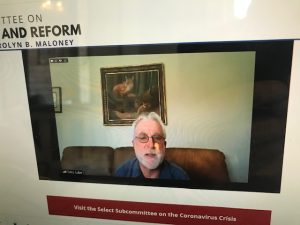
Kingfisher County farmer Terry Luber didn’t set out to be the driving force that led to a Congressional hearing where Cheniere Energy and its Midship natural gas line in Oklahoma were put on notice by some U.S. Representatives.
But he ended up testifying Wednesday during a House Oversight and Reform Committee’s Subcommittee on Civil Rights and Civil Liberties virtual hearing where Cheniere Energy was accused of not only misleading Oklahoma landowners about the construction of the 200-mile natural gas line but intimidating them as well through the eminent domain process.
Luber, a 4th generation farmer was one of those who complained about the lack of land restoration following last year’s complete of the Midship pipeline that carries natural gas out of Oklahoma’s STACK and SCOOP plays to Gulf Coast refineries.

“I’d have to sell my farm to pay for the costs to fix my farm,” he said under questioning. “It’s unfathomable how much it would cost to fix.”
He told Subcommittee chairman, Rep. Jamie Raskin of Maryland examples of how Midship pipeline operators let things go unfixed following construction. Further, Luber complained how the eminent domain power was used against him and others and there was nothing they could do to stop it.
“It was like kicking the door in. They used the fear factor. They were relentless and intimidating all the way through.”
But Luber said he never opposed the pipeline and previously had spent 8 years working in the oilfields. It was after the installation of the pipeline that Luber charged the company ignored his requests to restore the land they let go unfixed.
“They actually destroyed it. They paid lip service to us and did not try to do anything to help. In fact, they retaliated,” he answered under questioning.
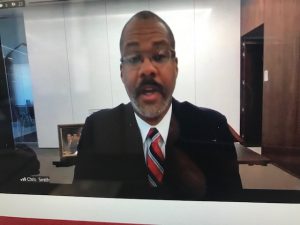
Put on the spot time and again by both Democrats and Republicans on the subcommittee, Cheniere Energy’s Christopher Smith, Senior Vice President for Policy, Government and Public Affairs promised repeatedly that the company would comply with a May 17 deadline set by the Federal Energy Regulatory Commission following an earlier hearing.
“Just to give the committee perspective, the pipeline project is a total of about 200 miles, and today we are talking about approximately 21 miles identified in the FERC Order that require restoration,” he said in his opening statements.
Smith also told the members of Congress that more than 70% of the identified tracts in the FERC order were either completed or awaiting inspection results.
“There are some things we will have to do differently,” said Smith. “That’s the best answer I can give you.”
He told the subcommittee Midship had people on the ground working to reconstruct the damaged land and finishing repairs in the remaining 12-13 days.
““We currently anticipate meeting all of our restoration obligations under the Order by the May 17 deadline, with the important caveat that alternate arrangements are being pursued in some cases.”
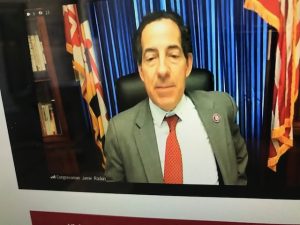
Cheniere wasn’t alone in being criticized by Subcommittee chairman Raskin.
“Our Subcommittee has been investigating FERC’s process for permitting natural gas pipelines and its effect on the rights of landowners since February of last year. Our initial investigation revealed that FERC’s rules and practices allow private energy companies to trample the rights of individual landowners,” he asserted in his opening statement.
“After hearing about the problems with Cheniere’s Midship pipeline, we investigated and found that FERC routinely allows pipelines to go into service before the companies have fully restored the land they damaged during construction. That means that the companies, if you think about it, have no real incentive to settle with and satisfy the valid demands of landowners for repair of the land and face minimal consequences for not doing so,” added the Democratic subcommittee chairman.
Other Representatives were critical in their questions of Smith and supportive of Luber.
“Seems like eminent domain was used as a weapon,” charged Rep. Debbie Wasserman-Schultz of Florida.
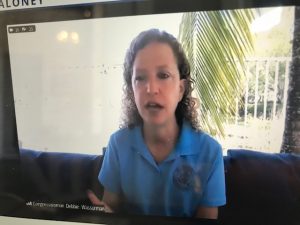
When she pushed Smith whether the company was “above the law,” he replied “no.”
“We’re gonna hold you to that. It’s completely unacceptable.”
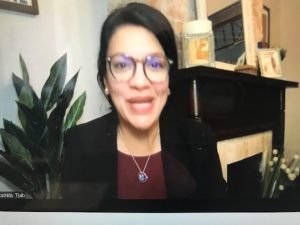
Rep. Tashida Tlaib, the Michigan Democrat who is a member of the Squad, the informal group of six members of the left wing of the Democratic party, accused Cheniere Energy of “misleading” Luber and other landowners.
“Mr. Luber’s experience is really tragic. This is a tragedy. Mr. Luber was robbed out of his livelihood,” she said during her 5-minute segment of questions.
She scolded Smith about the treatment given the landowners.
“They were doing the right thing. They were not against you!”
Chairman Raskin wrapped up the hearing by suggesting it could lead to changes in the eminent domain power—changes that will protect people.
“It’s unbelievable that government can delegate eminent domain and allow Big Brother to violate rights of the people.”





